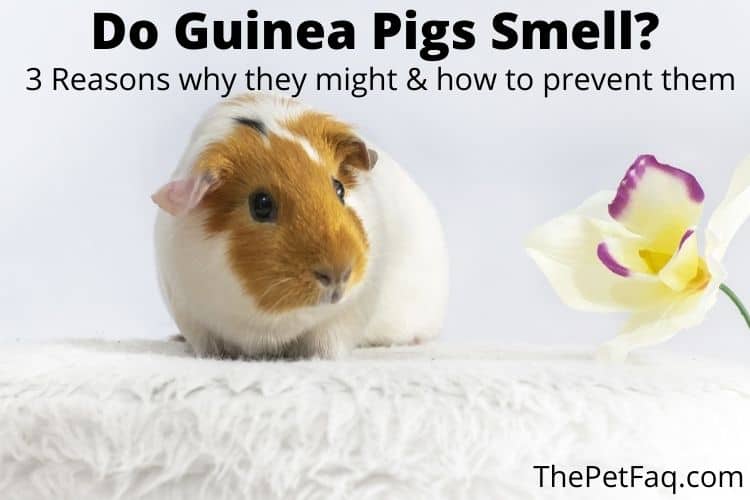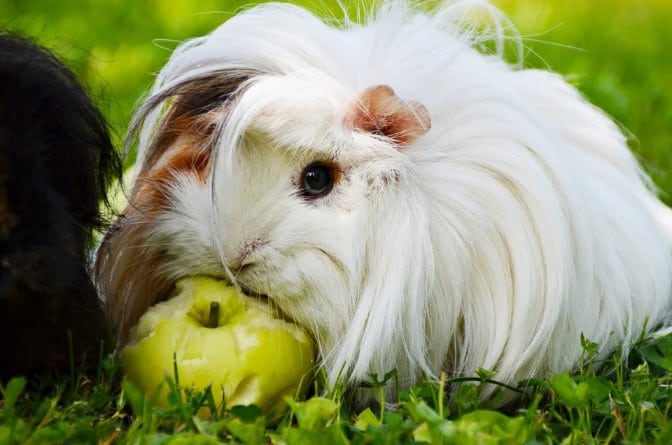Every pet owner is familiar with the odor blasting sprays, the pet-specific vacuums, and how to keep your home clean with a pet guide, but one thing is true. Our beloved companions do have a natural odor to them and some happen to be stronger than others.
There are several factors when it comes to Guinea Pigs and their odor. While they have a natural animal smell, they also have bedding and food that creates odors. This can all mix together to create that small animal smell that can be quite unpleasant. But, with weekly cage cleanings, picking up extra or old food, and maintaining your piggie’s grooming habits, you can manage the odor in your home.
We’ll discuss Guinea Pig’s natural odor, reasons for odors, how to prevent them, and a few other topics to best prepare you for the smell of a small animal in your home.

Do Guinea Pigs smell naturally?
Guinea Pigs have a slightly musky, animal smell. All pets, much like humans, have a natural body odor and it is through our upkeep that we minimize odors. Imagine if someone didn’t take a shower for a few days, soon they’d start to have an unpleasant odor.
Well, piggies are no different. These little guys are fastidious about grooming and will engage in grooming behaviors multiple times a day, both with themselves and their friends. This daily grooming keeps a piggy clean and is also a positive social behavior.
Above all, if you do notice a strong smell on your piggy, it is most likely their enclosure that is the culprit. If you clean their enclosure often and yet a strong odor persists, it could point to health issues with your piggy.
Do some guinea pig breeds smell worse?

It may seem like a natural assumption that a long-haired Guinea Pig, such as a Peruvian, will have more of an odor than their short-haired or hairless cousins. Quite simply, this is not true. A pet’s coat usually does not factor into their aroma, as their smells come from scent glands and skin types.
This also remains true for the Skinny Pig, which is an almost hairless breed of Guinea Pig. They will have the same grooming habits as any other piggy breed and any new or stronger odor can be attributed to a dirty enclosure or health issues.
Nevertheless, long-haired guinea pig breeds do have much more hair for urine, feces, or old food to get stuck in. Because of this, long-haired guinea pigs do sometimes have a stronger odor than shorter-haired breeds. Of course, this can be prevented with proper grooming.
Reasons for odors and prevention
Once you, or an outsider to your home, can smell your Guinea Pig, it’s time to look at the factors that can affect their natural smells. As stated, Guinea Pigs have a very minimal, slightly musky smell that should never be unpleasant. These little guys are very invested in their daily grooming and prefer to be in clean spaces.
There are three main reasons as to why your cavy has started to smell strongly. Let’s go over them one by one to see how you can prevent them from happening.
1. A dirty cage
Being fastidious groomers, guinea pigs themselves will be clean, but like all other animals, they still need to release themselves. Because of that, they will naturally have urine and poop lying around their enclosures. This means that their bedding soaks up urine and feces, which will cause strong, unpleasant odors. To prevent this, replacing their bedding frequently is important and it is imperative that you clean their enclosures weekly and deep clean them at least once a month.
2. Food
Secondly, what you feed your cavy is going to be a huge factor in their smells. Fresh, crisp vegetables are usually eaten within seconds, but if not, these foods rot and give off odors. Another source of food that becomes smelly quickly is their pellets. If left to sit in their dishes, a Guinea Pig’s saliva will build up along with bacteria, which can be harmful to their health along with strong smells. A once-weekly cleaning of their food dishes will eliminate this buildup and keep your (and their!) house smelling fresh.
3. Health
Finally, your piggy’s health can contribute to odors and should be monitored closely. A happy Guinea Pig will groom often, have clean fur, and enjoy spending time with its owners. If you notice your piggy has a loss in hair, has become more aggressive, or has diarrhea, these are signs of an unhealthy pig and can be the cause of strong odors.
If you notice that your guinea pig smells bad and you’re sure that their cage is clean and that they do not have food or feces stuck in their hair you should take them to a vet for a check-up.
Male vs female guinea pig scent
Much like larger male mammals, male Guinea Pigs have a unique scent gland that is used to mark territory or assert dominance. This scent gland is located where most mammals have a tail, but Guinea Pigs do not have tails!
This gland can become greasy if not cleaned regularly and will cause strong odors from your male piggy. It can also lead to infections, so it is important to groom and clean your male cavy often. The scent itself secreted from the gland will not be overpowering in your home, but it can become very strong when it is not properly cared for.
To learn how to properly clean the grease gland, check out this informative video:
Conclusion
Guinea Pigs are wonderful pets and bring joy into your home. With proper care, as with all pets, you can keep your home smelling fresh while enjoying a pet companion. They should never smell more than a slight natural, musky smell and when they do, it’s time to clean their enclosure or check their health.
With weekly cleanings of their enclosures and grooming, you’ll ensure your piggy is happy and healthy while maintaining a fresh-smelling home. The little guys are easy to care for and most breeds don’t require much grooming, but all definitely require clean enclosures, fresh food, and water. Much like you keep your own home clean, you’ll want to keep your cavy’s home clean and fresh as well. This will minimize small animal smells and ensure a happy relationship between you and your pet.
- How Long Do American Eskimo Dogs Live? Important Factors and Care Tips - September 29, 2023
- Do American Bulldogs Need Grooming? Essential Tips and Care Guidelines - September 29, 2023
- Do Bengal Cats Enjoy Playing? Essential Tips for Keeping Them Active - September 29, 2023